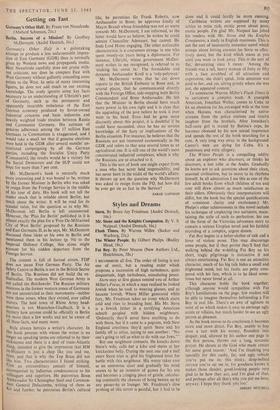Styles and Dreams
I RECOMMEND all five. The order of listing is not one of merit, but a reading order which proposes a succession of high turbulence, quiet disquietude, high turbulence, stimulating peace.
Stern may at first glance remind you of Arthur Miller's Focus, in which a man realised he looked Jewish when he took to wearing glasses, and so became Jewish. Where Miller generated white fury, Mr. Friedman takes an irony which starts cold and rises to branding heat. His Mr. Stern is a Jewish father in a terrifying American suburb peopled with hidden neighbours. `Ordinarily they'd never have anything to do with Stern, but if it came to a pogrom, with New England crustiness they'd spirit Stern and his family off to attics, saying to one another: "No one's going to tell us what to do with our Jews."'
But one neighbour connects. He knocks down Stern's wife, calls her a kike and stares at her knickerless belly. During the next one and a half years Stern tries to gird his frightened loins for battle with this neighbour. His worry takes root as an enormous ulcer and gradually his mind ceases to be an inventor of games for his son and becomes a cringing piece of gristle, calculat- ing constantly the chances of being beaten up by any passer-by or lounger. Mr. Friedman's slow probing of this terror is painful, but it had to be
done and it could hardly be more cunning. Caribbean writers are supposed by many critics to write rich, exotic prose about poor,
exotic people. I'm glad Mr. Naipaul has jolted
his readers with Mr. Stone and the Knights Companion, a study in English mustiness. This is
not the sort of necessarily muscular novel which stomps about hitting enemies (as Stern so effec- tively does), but the kind which stares at you until you want to look away. This is the sort of flat, devastating stare I mean: 'Among the friends was a tall, heavy woman of forty or fifty with a face scrubbed of all attraction and expression; she didn't speak, little attention was paid to her, and yet, sitting primly where she was put, she appeared content.'
To summarise Warren Miller's Flush Times is to caricature a complex book. A youngish American, Jonathan Weller, comes to Cuba to fix an abortion for his estranged wife at the time when Havana was characterised by native screams from the police stations and tourist laughter from the brothels. After Jonathan's half-caste girl is erased by Batista's cops, he becomes obsessed by his new sexual impotence and spends the rest of the book searching for a cure. A very long way away in the background Castro's men are dying for Cuba. It's a passionate and witty allegory.
The Winter People is a compelling oddity about an explorer who discovers, or thinks he discovers, a lost tribe In the Andes. Gradually he learns not to ask questions about their clean, seasonal civilisation, but to move to its rhythms himself. In all admiration I see this as one of the few adult books from which children of ten and over will draw almost as much satisfaction as their elders. (Obviously their interpretations will differ, but the book has the special qualifications of consistent clarity and excitement.) Mr. Phelps's other achievements in this novel include his technique of employing two narrators, main- taining the style of each to perfection; his use of the form of the Victorian adventure story to contain a serious Utopian novel and his faithful recording of a complex, urgent dream.
Fat Boy begins in a helter-skelter of talk and a fever of violent prose. This may discourage some people, but if they persist they'll find that walking behind the wobbling Tat Boy on his short, tragic pilgrimage is instructive if not always entertaining. Fat Boy is not an attractive character, much of his big talk hides a small and frightened mind, but his faults are petty com- pared with his fate, which is to be liked some- times but never loved at all.
This character holds the book together; although anyone would sympathise with Fat Boy's humiliations on the page, few readers will be able to imagine themselves befriending a Fat Boy in real life. There's an awe of ugliness in most of us which makes it easy to envisage ugly saints or villains, but much harder to see an ugly person as pleasant.
As the book moves to its conclusion it becomes more and more direct. Fat Boy, unable to buy even a tart with his money, flounders into despair, and, allowed by his author one page in the first person, throws out a long, sarcastic prayer. He shouts at the God who made cancer for some good reason: 'And I'm thanking you specially for this cushy, fat, and ugly vehicle you've put me in; this stinky, drop-bellied carcase you've sat me in; for goodness knows it makes those slender, good-looking people very glad to be how they are, and I'm glad of that, and perhaps after all that's why you put me here, anyway. I hope they thank you too.'
ADRIAN MITCHELL


































 Previous page
Previous page